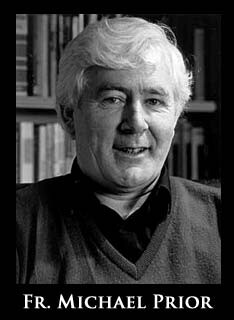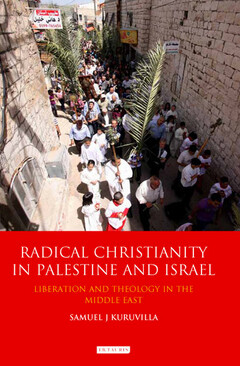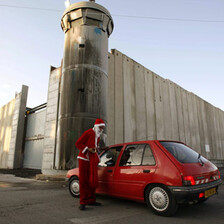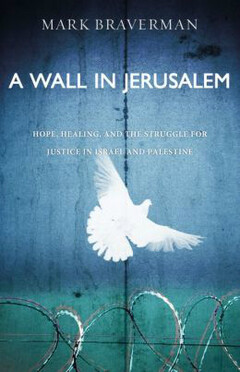The Electronic Intifada 23 July 2004

The gifts of the Lord lie torn
Into whose charge the gifts were given
Have made it a curse for so many to be born
This is my trouble —
These were my fathers
So how am I supposed to feel
Way out on the rim of the broken wheel?
— Lyrics from Broken Wheel, Bruce Cockburn
Christian Zionism is the term given to a movement in the Christian Church that means — in today’s terms — Christian support for the State of Israel. A particularly, although not exclusively American phenomenon that blossomed in the wake of Hal Lindsay’s apocalyptic bestseller, The Late Great Planet Earth, the theology of Christian Zionism is based on a number of key Old Testament passages enjoining believers to “Bless [the biblical people of] Israel”.
Christian Zionists represent one of the most largest political forces in the United States, a political Amen Chorus for Israel, right or wrong:
On the platform, an Israeli student is telling thousands of supporters how the horrors of the year have only reinforced his people’s determination. “Despite the terror attacks, they’ll never drive us away out of our God-given land,” he says. This is greeted with whoops and hollers and waving of Israeli flags and the blowing of the shofar, the Jewish ceremonial ram’s horn. Then comes the mayor of Jerusalem, Ehud Olmert, who is received even more rapturously… The placards round the hall insist that every inch of the Holy Land should belong to Israel and that there should never be a Palestinian state. These assertions are backed up by biblical quotations. It could be a rally in Jerusalem for those Israelis who think Ariel Sharon is a dangerous softie. But something very strange is going on here. There are thousands of people cheering for Israel in the huge Washington Convention Centre. But not one of them appears to be Jewish, at least not in the conventional sense. For this is the annual gathering of a very non-Jewish organization indeed: the Christian Coalition of America.— Matthew Engel, The Guardian, 28 October 2002.
The fundamental contradiction of Christian Zionism is that it requires adherents to accept that a handful of Old Testament verses have more theological weight than the person and character of Jesus himself, whom the New Testament describes as “the image of the invisible God”, essentially a person that serves as a picture of the nature of God.
Christian Zionists are investing their time, energy and money — three elements that comprise a fair, modern definition of ‘worship’ — in a secular national-political entity at the expense of the direct commands of the Christ they follow, who unambiguously stated that “Whatever you do to the least of them [people], you do to me.” In the texts of Christian Zionism, this last verse may as well be footnoted:
* Offer does not apply to Palestinians.
As Israel brutally represses those Palestinian people who dare to protest the bulldozers that raze their lands and fields and leave them homeless, imprisoning entire cities within prison walls, Christian Zionists are found praising God for giving the Jews a home at last.
It is hard to imagine a more obvious heresy against the Gospel of Love, unless of course you are the kind of Christian who can imagine Jesus jumping into the pilot seat of an AH-1 Apache combat helicopter and flying off to indiscriminately bomb a nearby refugee camp in “retaliation”. Who Would Jesus Bomb? indeed.
Father Michael Prior worked tirelessly for over 20 years of his life to expose the racism, false favoritism, deception, and blatantly ‘unJesuslike’ core assumptions of the theology of Christian Zionism. As a Christian theologian and philosopher he felt responsible for confronting the contradictions of the philosophy by weaving tapestries of understanding from the more mainstream pages of the Bible that Christian Zionists have torn out and discarded.
In a series of books, papers, conference appearances, and through the solid and enduring work of the UK-based Living Stones organisation he cofounded, Fr. Prior drew Christian’s attention to the fact that their pilgrimages to see the ‘dead stones’ of the Holy Land rarely incorporated any exposure to the many thousands of Palestinian Christians, the “living stones” of the land.
Michael spared no time getting to the point. In a March 2003 interview with The Witness, he explained one of his key contentions with the theology:
“The God they portray looks to me to be a militaristic and xenophobic genocidist who would not be even sufficiently moral to conform to the Fourth Geneva Convention. How, I constantly ask myself, are such people so unconcerned about others being kicked out of their homes, children being shot, people struggling for survival against very oppressive forces of occupation? Instead of trying to give food to the hungry and sight to the blind, as Jesus exhorted, these people support institutions that make seeing people blind, put free people in prison, and make the poor poorer. But it is extremely difficult to make progress in the face of worldviews which are held tenaciously, and considered to be in conformity with the will of God as revealed in the Scriptures. I go back to the fundamental question: Is God moral? Is God just? Is God a God of love, compassion, tenderness and justice? Or, rather, is God the great ethnic cleanser? Those are fundamental questions that I would like the evangelical Zionist constituency to consider.”
As Coordinator of Living Stones from 1993-1994, I spent much time working and socialising with Michael and other members of the board. Although Michael was a Catholic priest helping to run an organisation with both Protestants and Catholics, church members and church officials, from a variety of denominations, there was none of the tension or status fixation common in many Christian organisations. His cheery, cheeky demeanor and his unassuming view of his widely respected religious titles made him one of the most approachable religious leaders I have met. Michael will be missed by many. His contributions to the understanding of the Christian Church and refusal to allow Palestinian Christians to be the invisible children of a lesser God will be remembered. The world is a little bit darker with his passing.
Naim Ateek, Director of the Sabeel Ecumenical Liberation Theology Center, a prominent Palestinian Christian and close friend of Michael Prior, wrote today:
“Although, he has left us and we mourn his loss, he is ‘still speaking’ through his books, lectures, and various publications. His voice will continue to be heard in many places throughout the world. His strong prophetic message will reverberate until justice for the Palestinians is done and peace and reconciliation are achieved in the Holy Land for all of its people.”
Related Links
Nigel Parry is a cofounder of the Electronic Intifada.





